How to protect yourself against malicious websites
What for: So cybercriminals do not get your data by fraudulent means.
Scammers often make copies of popular websites to steal user data. If you fail to spot a fake in time, your credentials or bank card details could wind up in cybercriminals’ hands.
By default, Safari protects against fake sites and warns users if a page is not genuine. Check your settings in case you disabled this feature.
- Open your phone's Settings;
- Find and select Safari in the list of apps;
- Scroll down to Privacy & Security and enable Fraudulent Website Warning.

What for: To protect against vulnerabilities.
JavaScript is used to display interactive objects and animations, such as buttons and drop-down menus, on websites. Even though built into nearly all Web pages, this programming language contains plenty of well-known vulnerabilities. These are often abused by cybercriminals to steal personal data and infect smartphones with malware. Disable JavaScript to eliminate the risk.
- Open your phone's Settings;
- Find and select Safari in the list of apps;
- Scroll down and tap Extensions;
- Turn off the JavaScript function.

Downside: Some website features will become unavailable, and some pages may work incorrectly.
How to hide your data from prying eyes
What for: Anonymous browsing.
The browser usually saves information about the pages you visit, the passwords you enter, the permissions you give, and some website data. If you want to hide these — for example, when using someone else's phone — browse in private mode. In this case, Safari won’t save your browsing and download history. Additionally, a separate session is created for each page, which means advertisers won’t be able to sniff out your online activity through trackers in other tabs.
To open a private window:
- Tap the tab switch button (two squares icon at the bottom right of the Safari screen);
- At the bottom left, select Private;
- Tap the plus sign to open a new private window.

Downside: Having to remember the pages you viewed and enter your credentials each time.
What for: To hide your favorite websites from prying eyes.
By default, when you open a new window, Safari loads all your Favorites tabs, as well as links to frequently visited websites. This lets you quickly open the ones you often visit. However, if you are in a public place, outsiders might see the list of these pages. To remove websites from Favorites:
- Tap the open book icon at the bottom right of the Safari screen;
- In the window that opens, go to the tab with the open book icon, in the upper left of the screen;
- Open Favourites;
- Tap Edit at the bottom right of the screen;
- Tap the red minus button to the left of each tab one by one, confirming your choice each time;
- Click Done.
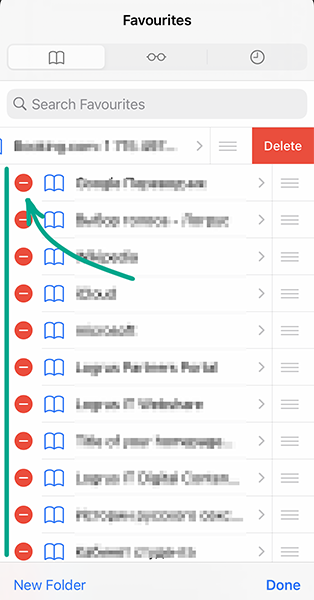
To hide frequently visited websites:
- Open your phone's Settings;
- Find and select Safari in the list of apps;
- Under General, toggle off Frequently Visited Sites.
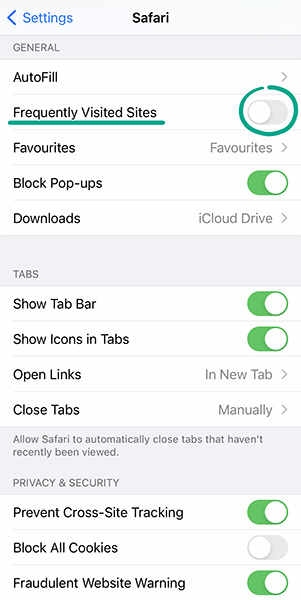
How to keep corporations out of your business
What for: So advertisers do not know which websites you visit.
Some websites use third-party cookies. They are placed by ad networks to track your online activity. You can ban websites from sharing this data with third parties.
- Open your phone's Settings;
- Find and select Safari in the list of apps;
- Under Privacy & Security, enable Prevent Cross-Site Tracking.
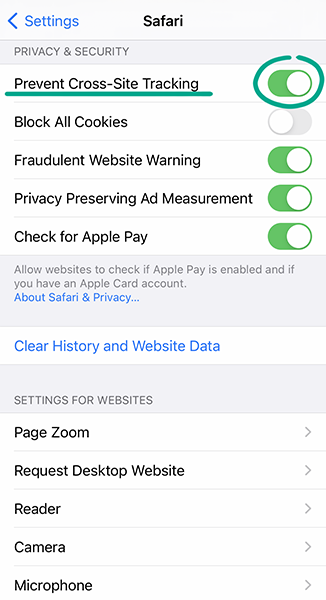
What for: So no one can eavesdrop or spy on you.
Websites can request permission to access your camera and microphone. For example, a technical support page can request such permission to enable voice chat with an expert. However, malicious websites can trick you into giving them this permission and then spy on you. To protect yourself, restrict access to your camera and microphone:
- Open your phone's Settings;
- Find and select Safari in the list of apps;
- Scroll down to Settings for Websites, open the Camera menu, and select Ask or Deny to restrict camera access on all websites;
- Likewise open the Microphone menu and select Ask or Deny to restrict microphone access on all websites.

What for: So no one knows where you are.
Some websites may ask for permission to access your geolocation. For example, a delivery service page can request that to enter your address for you. This permission is permanent, so when you visit the website again, it will learn where you are.
To avoid this, you can ban websites from requesting geolocation.
- Open your phone's Settings;
- Find and select Safari in the list of apps;
- Scroll down to Settings for Websites, open the Location menu, and select Ask or Deny to restrict access to geolocation for all websites.
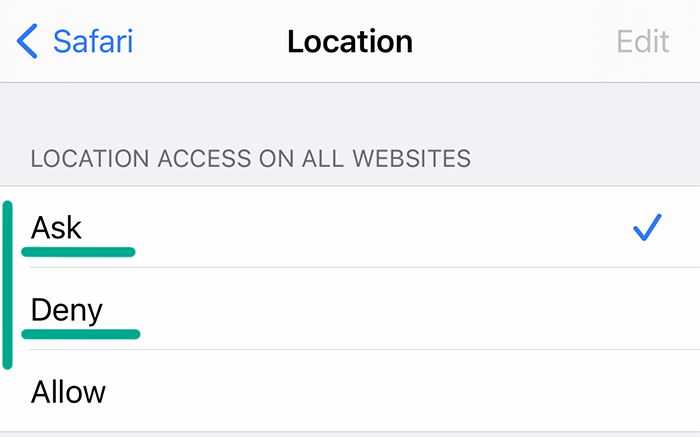
Downside: Having to enter your location by hand.
What for: To prevent search giants from gathering information about you.
Most search engines, such as Google or Bing, store user information and queries. This allows these companies to show customized search results and promote their services. However, there are services that do not collect any such data, e.g. DuckDuckGo. If you prefer to stay anonymous, you can assign this service as the default search engine.
- Open your phone's Settings;
- Find and select Safari in the list of apps;
- Find Search Engine and select DuckDuckGo from the drop-down list.
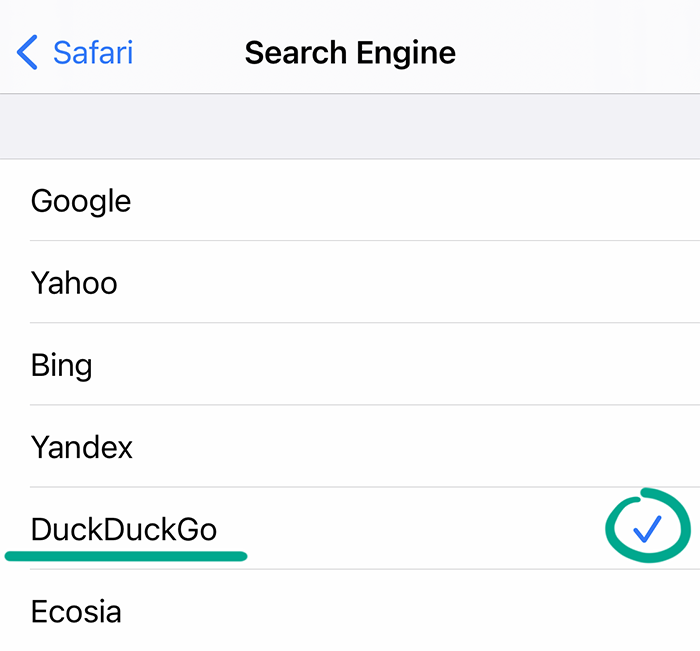
What for: So marketers cannot build a profile of you.
When you visit a website, a small file gets saved on your phone. It contains information about the system and your actions on the page. Known as cookies, these files are used by websites to identify visitors and display personalized ads. For example, they might contain your username and password for a social network. In the browser settings, you can restrict how websites use cookies.
- Open your phone's Settings;
- Find and select Safari in the list of apps;
- Scroll down to Privacy & Security and enable Block All Cookies.

Downside: Having to enter your credentials and configure the settings each time you visit a website.
How to protect your data
What for: To protect against hacking.
When you sign in to a website, Safari prompts you to save the password in your keychain. This lets you automatically enter your credentials on subsequent visits. In your smartphone settings, you can check the strength of saved passwords, replace duplicate or weak ones, and make sure that none has been stolen.
- Open your phone's Settings;
- Scroll down and open the Passwords menu; Use Touch ID, Face ID, or a passcode to sign in;
- Select Security Recommendations;
- Make sure that Detect Compromised Passwords is enabled;
- If a password has been stolen, is used on more than one site, or is not strong enough, you will see the vulnerable resource listed with detailed information;
- Tap Change Password on Website and follow the link to replace it with a unique and strong password.

What for: To protect against hacking.
When you sign in to a website, Safari prompts you to save the password in your keychain. This lets you automatically enter your credentials on subsequent visits. In your smartphone settings, you can check the strength of saved passwords, replace duplicate or weak ones, and make sure that none has been stolen.
- Open your phone's Settings;
- Scroll down and open the Passwords menu; Use Touch ID, Face ID, or a passcode to sign in;
- Select Security Recommendations;
- Make sure that Detect Compromised Passwords is enabled;
- If a password has been stolen, is used on more than one site, or is not strong enough, you will see the vulnerable resource listed with detailed information;
- Tap Change Password on Website and follow the link to replace it with a unique and strong password.
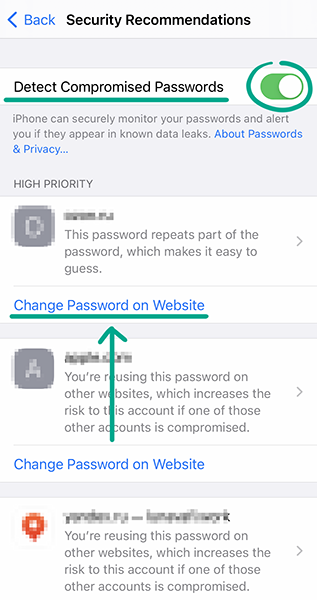
What for: So no one gains access to your accounts and money.
Safari can autofill credentials and contact/billing information saved in your keychain. If someone who knows your passcode gets hold of your phone, they will be able to log in to your account on a social network or pay for things even without knowing your card number. To protect against such scenarios, turn off the autofill option.
- Open your phone's Settings;
- Find and select Safari in the list of apps;
- Open the AutoFill menu;
- Toggle off Use Contact Info and Credit Cards.
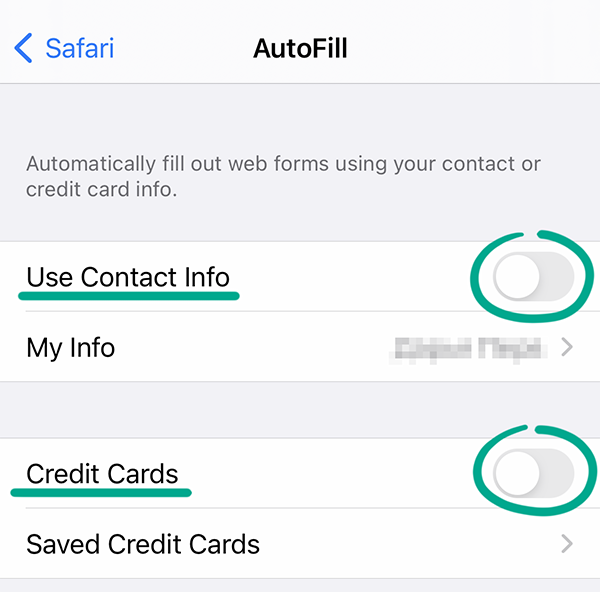
To delete previously saved card details, in the AutoFill menu:
- Go to Saved Credit Cards;
- Use Touch ID, Face ID, or a passcode to sign in;
- Select the card you want, swipe left, and tap Delete on the right.
Downside: Having to enter credentials or card details every time you log in or buy something online.
You can avoid the inconvenience and improve the security of your accounts using a password manager. Unlike a browser, it does not access third-party resources on the Web, which means it is protected from malicious websites. Moreover, it cannot be hacked through a vulnerable extension or plug-in, while browsers can.
How to feel comfortable online
What for: To save traffic and avoid distractions.
Some websites automatically start playing videos as soon as you open a page. It saves you pressing the start button. However, if you are in a public place or on a limited network, this feature can be a pain. You can turn off automatic playback or mute it in the settings.
- Open your phone's Settings;
- Scroll down and select Accessibility;
- Go to Motion;
- Turn off the Auto-Play Video Previews option.
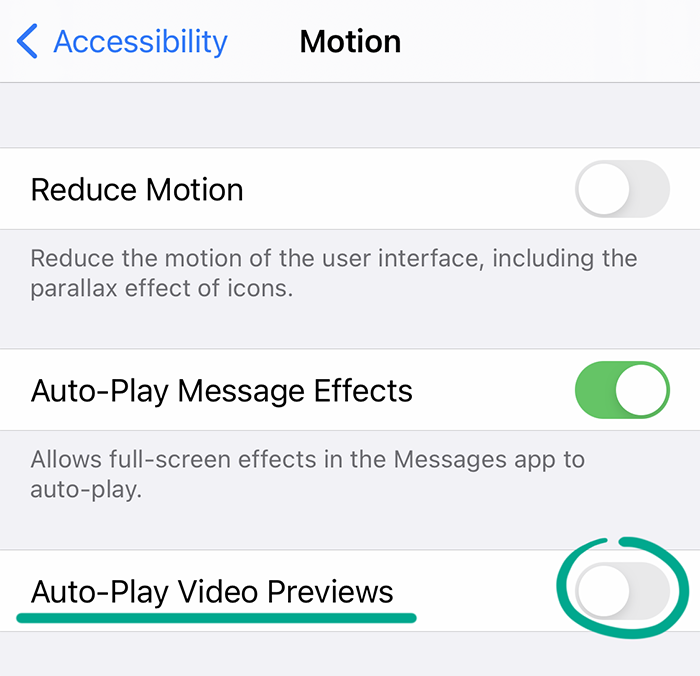
What for: Not to dig around in the settings when having problems with a single page.
You can fine tune individual websites without opening browser settings. This is handy if you need to change permissions or turn off notifications for a certain page, but do not want to alter the general settings.
- Open the website;
- Click the АА icon to the left of the URL;
- In the drop-down menu, select Settings for Websites;
- Configure the settings.
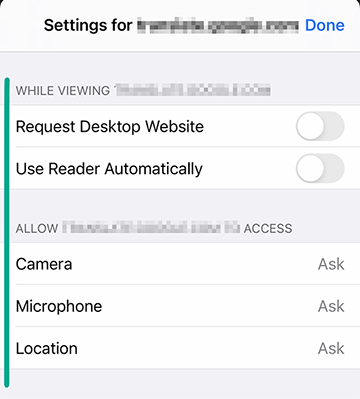
What for: To get rid of intrusive ads and messages.
By default, Safari asks for permission to show pop-ups if a website tries to open them. If these notifications bug you, you can turn off pop-ups for all websites in the settings.
- Open your phone's Settings;
- Find and select Safari in the list of apps;
- Scroll down to General and enable Block Pop-ups.








